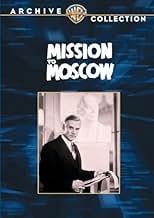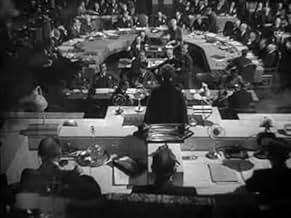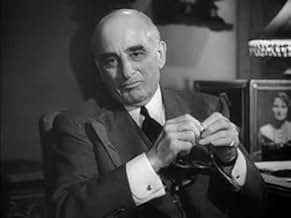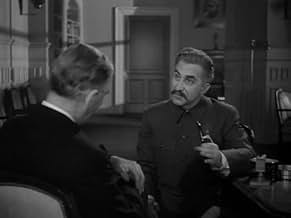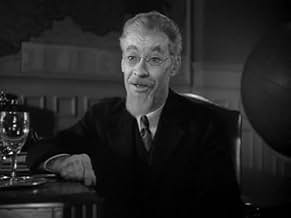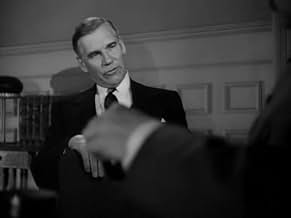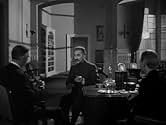VALUTAZIONE IMDb
5,4/10
1110
LA TUA VALUTAZIONE
Aggiungi una trama nella tua linguaAmbassador Joseph Davies is sent by FDR to Russia to learn about the Soviet system and returns to America as an advocate of Stalinism.Ambassador Joseph Davies is sent by FDR to Russia to learn about the Soviet system and returns to America as an advocate of Stalinism.Ambassador Joseph Davies is sent by FDR to Russia to learn about the Soviet system and returns to America as an advocate of Stalinism.
- Regia
- Sceneggiatura
- Star
- Candidato a 1 Oscar
- 2 vittorie e 1 candidatura in totale
Recensioni in evidenza
Is that why he put forward this saccharine view of the Soviet Union? It was done sincerely and naively, was it?
I remember this -- the 1943 film version of Ambassador Davies' book -- as quite dull, in spite of its obvious historical and political interest, from when I last saw it a number of years ago. In the notes I took down at the time, I have the film labelled as "disturbing propaganda" and cite two choice quotations:
"At least, one European nation with no aggressive intentions is ready for whatever comes", exclaims Ambassador Davies (as portrayed by Walter Huston).
According to a Soviet minister, "The army is strengthened by the purge of its traitors."
(Stalin almost succeeded in strengthening his army right out of existence.)
Amazon lists a couple of scholarly titles specific to the Ambassador Davies controversy. Perhaps this film will whet your appetite for a little more background.
I remember this -- the 1943 film version of Ambassador Davies' book -- as quite dull, in spite of its obvious historical and political interest, from when I last saw it a number of years ago. In the notes I took down at the time, I have the film labelled as "disturbing propaganda" and cite two choice quotations:
"At least, one European nation with no aggressive intentions is ready for whatever comes", exclaims Ambassador Davies (as portrayed by Walter Huston).
According to a Soviet minister, "The army is strengthened by the purge of its traitors."
(Stalin almost succeeded in strengthening his army right out of existence.)
Amazon lists a couple of scholarly titles specific to the Ambassador Davies controversy. Perhaps this film will whet your appetite for a little more background.
An odd little movie. "Mission to Moscow" was brought to my attention by a BBC documentary on Stalin in the war years "WWI Behind Closed Doors". It describes the intense diplomatic efforts made by the allies during WWII to bring the Soviet Union into the war against Germany. Leaders in the West were willing to cast a blind eye to Soviet brutality and repression, including the massacre of Polish military officers at Katyn and the establishment of puppet governments in the territories they controlled, in order to keep them on the side of the West. This effort involved swaying public opinion in Western countries, and Joseph Davies' "Mission to Moscow" was cited as an example of this effort. There is an excellent article on Davies in Wikipedia, which describes how keen he was to see only the positive in the Soviet Union. Ironies abound in this film. Molotov appears as a kindly old professorial gent, Stalin is a hopeful visionary yearning for world peace. The glimpses of daily life in the Soviet Union include ice skating parties with piles of food, high fashion for the ladies, English-speaking railroad workers with nothing but love for their country, and American expatriates expressing admiration for the inventiveness of the Russian hosts they are there to help. In fact, while Davies was ambassador, a large number of American expats were being imprisoned by Stalin as counter-revolutionaries, despite having voluntarily emigrated to the Soviet Union to contribute to building a new society. Many petitioned the US Embassy to have their passports restored, and Davies refused to intervene. At one point, the US embassy staff in Moscow threatened to resign en masse. When Stalin consolidated power with the purges of his former associates in 1936 ~ 1938, Davies attended several of the show trials, and in "Mission to Moscow" he is shown nodding knowingly when Bukharin and the other defendants "confess" to their anti-Soviet activities and conspiratorial association with the now arch-enemy Trotsky. In the movie, Davies repeatedly insists that his mission is to see the **real** Soviet Union first-hand, yet in his visits were said to have been highly scripted and organized by the Soviet authorities. In retrospect, Davies comes off as a naïve fool, but seen in the larger context, perhaps someone a little more competent would not have been able to supplied the West with the kind of pro-Soviet view Davies could supply.
But let's put history aside for a moment. This is just a bad film. It is stilted, over-scripted, and whatever points it is trying to make are spoon-fed to the audience. Davies had control over the final script, and his scenes come off as highly self-serving: Davies warning of the dangers of war over the objections of more experienced statesmen, Davies being congratulated at every turn by one world leader after the next for his insight into the coming war in Europe. You know pretty much at the beginning of each scene what is going to unfold – a vacation with the family to get away from world affairs ends with a phone call from the White House, a meeting with senators expressing doubt about the strength of Germany will end with Davies convincing them with facts to the contrary. And Walter Huston is just overworked here – he has to carry virtually every scene, because really, Mission to Moscow is mostly about Davies himself.
A just plain awful movie and yet fascinating to watch, especially for a glimpse into this brief period of time when the US actually tried to like Stalin, and fascinating also for the fantasy views of Soviet life in the late 1930s. And particularly worthwhile if you also take the time to research the persons and events portrayed in the movie and juxtapose these against the events portrayed in Mission to Moscow. It is a very educational experience.
At the time I saw this movie, it was not available on DVD, but could be downloaded from the Warner Brothers movie archive.
But let's put history aside for a moment. This is just a bad film. It is stilted, over-scripted, and whatever points it is trying to make are spoon-fed to the audience. Davies had control over the final script, and his scenes come off as highly self-serving: Davies warning of the dangers of war over the objections of more experienced statesmen, Davies being congratulated at every turn by one world leader after the next for his insight into the coming war in Europe. You know pretty much at the beginning of each scene what is going to unfold – a vacation with the family to get away from world affairs ends with a phone call from the White House, a meeting with senators expressing doubt about the strength of Germany will end with Davies convincing them with facts to the contrary. And Walter Huston is just overworked here – he has to carry virtually every scene, because really, Mission to Moscow is mostly about Davies himself.
A just plain awful movie and yet fascinating to watch, especially for a glimpse into this brief period of time when the US actually tried to like Stalin, and fascinating also for the fantasy views of Soviet life in the late 1930s. And particularly worthwhile if you also take the time to research the persons and events portrayed in the movie and juxtapose these against the events portrayed in Mission to Moscow. It is a very educational experience.
At the time I saw this movie, it was not available on DVD, but could be downloaded from the Warner Brothers movie archive.
Businessman Joseph Davies is sent to Stalin's Russia by FDR shortly before war breaks out. His assignment: assess the Soviet's war-making capabilities, the extent of their war-readiness and Stalin's reliability as a potential ally against Hitler. What he sees contradicts a good deal of the anti-Soviet reporting in the (Henry Luce) national press and elsewhere. The Soviets have organized a society of largely peasants and serfs into a first-class industrial power. The Stalin regime enjoys widespread popular support, and the Kremlin seems to be preparing for war with the Nazis. On the other hand, as Stalin warns half-way through the film, anti-Soviet feeling in the British and French governments may necessitate a temporary Soviet "truce" with Hitler to gain more time to prepare for war.
The film (by the director of "Casablanca" is frequently plodding and arcane. However, for war-time audiences, it offered an sure-footed defense of the Russian war effort at a time when the full capabilities of the Soviet Red Army were being dramatically made known (the film was released shortly after the seminal German surrender at Stalingrad, the most frightful battle of modern warfare). Too, much of the film suggests what recent historians have confirmed; Stalin's regime, while widely loathed in the West, precipitated an astonishing degree of devotion and loyalty at home, a point driven home by the outcome of a thousand battles from the Volga to Berlin.
It seems that just about every bit player in Hollywood appeared at least once in this movie. Watch especially for Glenn Strange in a three second appearance as a southern newspaper reporter. The fillm was a major part of the war effort half-way through that conflict, and appears to have succeeded admirably in its original purpose. Walter Huston, as Davies, is absolutely first rate as the droll, understated American capitalist who nevertheless comes to appreciate the war effort of a much maligned people and social system.
The film (by the director of "Casablanca" is frequently plodding and arcane. However, for war-time audiences, it offered an sure-footed defense of the Russian war effort at a time when the full capabilities of the Soviet Red Army were being dramatically made known (the film was released shortly after the seminal German surrender at Stalingrad, the most frightful battle of modern warfare). Too, much of the film suggests what recent historians have confirmed; Stalin's regime, while widely loathed in the West, precipitated an astonishing degree of devotion and loyalty at home, a point driven home by the outcome of a thousand battles from the Volga to Berlin.
It seems that just about every bit player in Hollywood appeared at least once in this movie. Watch especially for Glenn Strange in a three second appearance as a southern newspaper reporter. The fillm was a major part of the war effort half-way through that conflict, and appears to have succeeded admirably in its original purpose. Walter Huston, as Davies, is absolutely first rate as the droll, understated American capitalist who nevertheless comes to appreciate the war effort of a much maligned people and social system.
This film was made to patronize Joeseph Stalin and warm USA audiences to American-Soviet relations. Warner boss Jack Warner called it the worst mistake of his career. Warner was a supporter of FDR and Roosevelt asked him to have this film made based on the 1941 book by former Ambassador to the USSR (1936-1938) Joseph E. Davies. Several films were made during this time to achieve the same effect like song of Russia, North Star and Counter Attack but this was a film for Stalin to see himself, hand delivered on a yet another mission to Moscow by Davies. This film portrays the brutal dictator Stalin as a fair and just man who has turned his backward country into a progressive industrial and agricultural giant that is moving toward democracy and desires peace and protection of it's borders. It mentions nothing of the one million deaths in the Soviet gulags that happened during Davies' ambassadorial tenure on his mission to Moscow. It glosses over the infamous purge show trials where Stalin rid himself of prominent party leaders where he had 50 of the 54 of the three trials executed under the guise of traitors who were conspiring with Germany and Japan to weaken the USSR. Stalin wanted absolute power but this film portrays these as fair and just trials. The costly Russo-Finnish War of 1939 is described by Davies as simply the Soviets wanting to annex Finland to protect Finland from the Nazi's. 23,000 Finns were killed and 43,000 wounded in this so-called effort to protect them. 127,000 Soviets were killed and 265,000 wounded. There is no mention of Stalin's man-made famine of the 1930's that resulted in the genocide of millions of Ukrainians. Stalin is portrayed as everybody's favorite uncle and FDR wanted Stalin to see how sympathetic we were to to him by having him actually view this film to maneuver a FDR-Stalin meeting in Alaska. FDR sent former Ambassador Davies on another mission to Moscow with this film and a message to Stalin from Roosevelt as to how much he respected him. Davies' successor in Moscow Ambassador William H. Standley was not in the loop on this mission and furious and resigned. Davies screened this film for Stalin. Stalin wasn't that impressed with the film or FDR's intentions and stalled on the Alaska summit. FDR was forced to send Secretary of State Cordell Hull to Moscow and Stalin agreed to a summit in Teheran instead of Alaska which would also include Winston Churchill who FDR didn't want for his proposed Alaska summit.
Michael Curtiz is the director and the film looks good from an artistic standpoint. Curtiz was best known for Casablanca and after starting out as an important European director in the teens and twenties he moved to Hollywood and became an important filmmaker. Howard Koch who wrote screenplays for such films as Casablanca adapted the Davies' book for the screen which later got him blacklisted from Hollywood. Bert Glendon who did such films as Hotel Imperial and The Ten Commandments in the 20's, Kidnapped and Young Mr. Linclon in the 30's and One Night in Lisbon and Our Town in the 40's is the film's cinematographer. This film was nominated for an Academy Award for Best Art Direction and stars FDR's favorite actor Walter Huston as Ambassador Davies. Also in the talented cast are Ann Harding, George Tobias, Oscar Homolka, Eleanor Parker, Gene Lockhart, Frank Faylen and Cyd Charisse. You can enjoy the documentary style approach to this film and the skills of it's renowned filmmakers and big studio production but you can't get past a propaganda film that glorifies the Stalin dictatorship. I would give it a 4.5 out of 10.
Michael Curtiz is the director and the film looks good from an artistic standpoint. Curtiz was best known for Casablanca and after starting out as an important European director in the teens and twenties he moved to Hollywood and became an important filmmaker. Howard Koch who wrote screenplays for such films as Casablanca adapted the Davies' book for the screen which later got him blacklisted from Hollywood. Bert Glendon who did such films as Hotel Imperial and The Ten Commandments in the 20's, Kidnapped and Young Mr. Linclon in the 30's and One Night in Lisbon and Our Town in the 40's is the film's cinematographer. This film was nominated for an Academy Award for Best Art Direction and stars FDR's favorite actor Walter Huston as Ambassador Davies. Also in the talented cast are Ann Harding, George Tobias, Oscar Homolka, Eleanor Parker, Gene Lockhart, Frank Faylen and Cyd Charisse. You can enjoy the documentary style approach to this film and the skills of it's renowned filmmakers and big studio production but you can't get past a propaganda film that glorifies the Stalin dictatorship. I would give it a 4.5 out of 10.
Self-professed "capitalist" and businessman Joseph Davies is sent to Moscow by President FDR just prior to the outbreak of hostilities in Europe in 1939. His mission; assess the war-readiness of the Soviet people and the reliability of the Stalin regime as a potential ally.
What follows could be described as a "guided tour" of Soviet Russia, courtesy of the Kremlin. Davies embarks on a whirlwind inspection of Soviet farms, factories, schools and cities, all abuzz with the task of transforming a semi-feudal nation of serfs and peasants into a mighty world power. It is - as its critics claim - a heavy-handed glorification of the Soviet "workers" state under Stalin. At the same time, it is an early confirmation of what most recent historians have acknowledged; the Stalin regime, for all its flaws, was a popular regime with the Russian people with astounding achievements to its credit. Viewers, at any rate, can make up their own minds (a useful recent survey is *Stalinism as a Way of Life* - Yale U Press, 2000).
Walter Huston is effective as the droll, efficient Davies. Watch, too, for a plethora of uncredited "B" actors on screen for just a few seconds. Glenn Strange, Tom Tully and Kathleen Lockhart are familiar faces to fans of the thirties and forties and serve to jar us back to reality at critical points. The film is a useful antidote to the overwhelming and omnipotent anti-Sovietism of the Cold War, and should be taken as such.
What follows could be described as a "guided tour" of Soviet Russia, courtesy of the Kremlin. Davies embarks on a whirlwind inspection of Soviet farms, factories, schools and cities, all abuzz with the task of transforming a semi-feudal nation of serfs and peasants into a mighty world power. It is - as its critics claim - a heavy-handed glorification of the Soviet "workers" state under Stalin. At the same time, it is an early confirmation of what most recent historians have acknowledged; the Stalin regime, for all its flaws, was a popular regime with the Russian people with astounding achievements to its credit. Viewers, at any rate, can make up their own minds (a useful recent survey is *Stalinism as a Way of Life* - Yale U Press, 2000).
Walter Huston is effective as the droll, efficient Davies. Watch, too, for a plethora of uncredited "B" actors on screen for just a few seconds. Glenn Strange, Tom Tully and Kathleen Lockhart are familiar faces to fans of the thirties and forties and serve to jar us back to reality at critical points. The film is a useful antidote to the overwhelming and omnipotent anti-Sovietism of the Cold War, and should be taken as such.
Lo sapevi?
- QuizThis film was often mentioned during the 1947 House Un-American Activities Committee (HUAC) in its investigation of alleged Communist infiltration of the motion picture industry and was chiefly responsible for the blacklisting of screenwriter Howard Koch. Warner Bros. studio head Jack L. Warner defended the picture as being "made when our country was fighting for its existence, with Russia as one of our allies . . . The picture was made only to help a desperate war effort and not for posterity."
- BlooperAside from the issue of the fairness of the Moscow purge trials, or the truthfulness of the alleged confessions of the accused, the people shown standing trial together in the film in fact did not all stand trial at the same time. There were two such major show trials, one in 1937, the second in 1938, and the real life characters depicted in the film as being tried simultaneously were actually tried in separate groups at one of the two trials.
- Citazioni
Ambassador Joseph E. Davies: Mr. Stalin, I believe history will record you as a great builder for the benefit of mankind.
- Curiosità sui creditiOpens with a card reading: We have the honor to present the former Ambassador from the United States to the Soviet Union, the Honorable Joseph E. Davies, who will address you prior to the showing of the film made from his important book, "Mission to Moscow". In the picture itself, Mr. Walter Huston portrays Mr. Davies during those vital years encompassed in his now significant report to this nation. And now, Mr. Davies: [Mr. Davies gives a presentation on the actual events leading up to these events, and to this film.]
- ConnessioniFeatured in Hollywood on Trial (1976)
- Colonne sonoreAmerica
(uncredited)
aka "My Country 'tis of Thee"
Music from "God Save the King"
Traditional
[In the score when Woodrow Wilson's bust is shown]
I più visti
Accedi per valutare e creare un elenco di titoli salvati per ottenere consigli personalizzati
- How long is Mission to Moscow?Powered by Alexa
Dettagli
- Data di uscita
- Paese di origine
- Lingue
- Celebre anche come
- På uppdrag i Moskva
- Luoghi delle riprese
- Lake Arrowhead, San Bernardino National Forest, California, Stati Uniti(Lake that Joe and family set off in a dingy named after his wife Marjorie)
- Azienda produttrice
- Vedi altri crediti dell’azienda su IMDbPro
Botteghino
- Budget
- 1.516.000 USD (previsto)
- Tempo di esecuzione2 ore 4 minuti
- Colore
- Proporzioni
- 1.37 : 1
Contribuisci a questa pagina
Suggerisci una modifica o aggiungi i contenuti mancanti

